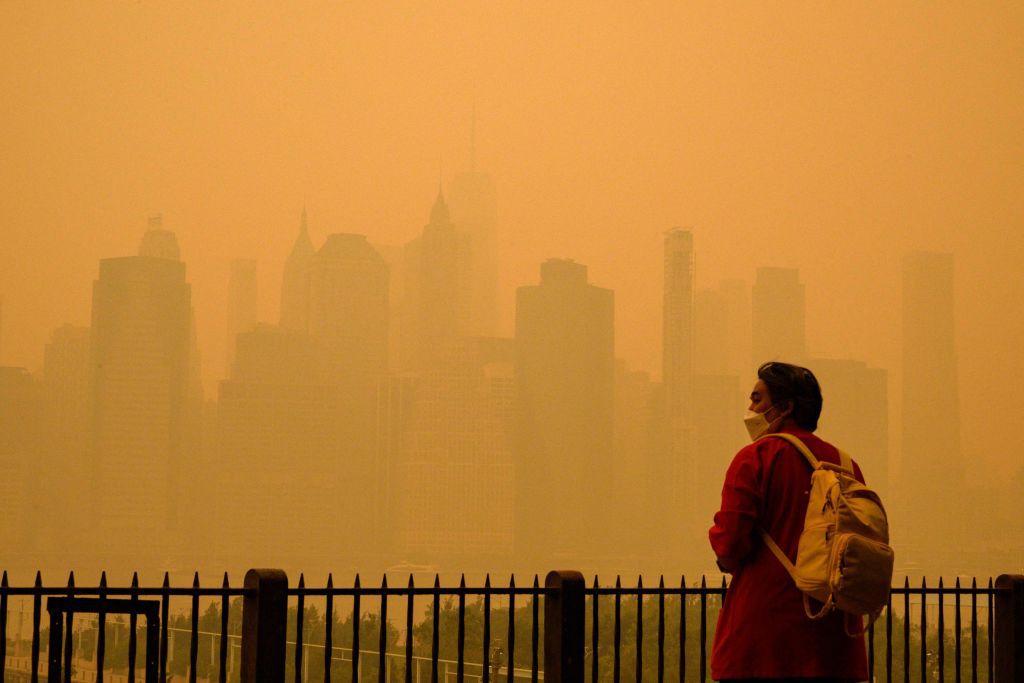- The Mask You Used for COVID is Likely the Best for Wildfire Smoke Protection!

Large regions of the United States are currently facing poor air quality due to smoke from wildfires in Canada. Health officials are urging people to take precautions in New York City, where the smoke has caused some of the worst air quality in the world. While the air quality has marginally improved since Wednesday afternoon, levels are still considered unhealthy. It might be a smart choice to wear high-quality masks similar to the ones worn during the COVID-19 pandemic if individuals are spending an extended amount of time outside.
Sara Adar, ScD, Associate Professor, and Associate Chair of Epidemiology at the University of Michigan School of Public Health emphasized that poor air quality can be dangerous to people's health. Wildfire smoke contains PM2.5, which is fine particulate matter that can reach the deepest parts of our lungs. These tiny particles can trigger inflammation in our lungs, activate the nerves in our lungs, and cause cardiovascular issues after longer periods of exposure.
Moreover, these particles could be linked to low weight and preterm births, worsened asthma symptoms, and increased risk of lung disease. PM2.5 also causes various conditions, such as coughing, breathing difficulties, skin or eye irritation, and headaches. Poor air quality peaked in New York City between noon and 3 PM on Wednesday. The standard for fine particulate matter is typically 35 µg/m3.
To stay safe, people should consider their circumstances, including how sensitive they are to the pollution or smoke, how much time they are spending outside, and their age or any pre-existing medical conditions. Young children breathe more air per body size than adults, and the elderly, pregnant women, and people with chronic diseases are at higher risk. When PM2.5 levels are unhealthy or extremely unhealthy, even those not susceptible to respiratory issues can be at risk, so wearing a high-quality mask outside is advised.
Joseph Allen, DSc, MPH, Associate Professor at the Harvard T.H. Chan School of Public Health and co-author of Healthy Buildings: How Indoor Spaces Can Make You Sick—or Keep You Well, highlighted that a high-quality mask can efficiently capture airborne particles, regardless of whether those particles are from a wildfire or someone's cough. Hence, choosing a good mask for COVID-19 is also a wise decision to protect against PM2.5.
“You want to think of the two Fs—filtration and fit. When it comes to filtration you want a high grade mask, whether it’s an N95 or a KF94,” Allen said. A KN95 would also be acceptable. “You want that mask snug on your face so that all the air you’re breathing is forced to go through the filter of the mask,' Allen added.
But other masks—like surgical or cloth masks—which don't have the same filtration or fit capabilities likely won't offer much protection.
Mask wearing can be beneficial when people are breathing in unhealthy air outside, but it’s equally important that they’re staying safe indoors, too.
People can consider buying air purifiers to help get the fine particulate matter out of the air in their homes, and they should keep windows closed. It’s also important to only run air conditioners if they don’t pull in air from outdoors and have a filter.
People can try building a Corsi-Rosenthal Box, which is essentially a DIY-version of an air purifier if the real deal is inaccessible, Adar said. This involves simply duct taping furnace filters around a box fan—the contraption can clean particulate matter out of the home.
Adar and Allen agreed that this bout of smokey air won’t last for much longer in the affected areas. But in the meantime, people should stay inside and do what they can to reduce their exposure to any potentially harmful PM2.5.
“My number one recommendation is to just spend more time indoors right now, if you can, while the smoke is really strong in your location,” Adar said. “I would try avoidance first, and then if you are susceptible, I would wear a mask if you have to be outside for a long period of time.'




